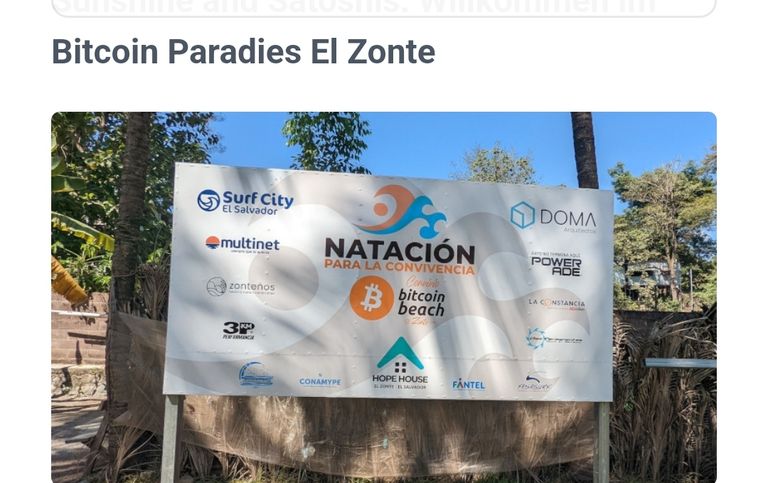Es war ein Novum in der Geschichte des Bitcoins, als der mittelamerikanische Staat El Salvador im September 2021 beschloss, die Ur-Kryptowährung zum offiziellen Zahlungsmittel im Land zu machen. Dies war nur der erste Schritt des krypto-affinen Landespräsidenten Nayik Bukele, der in den Folgejahren nicht nur immer wieder Bitcoins aus der Staatskasse bezahlte, sondern auch eine umfangreiche Kryptostrategie für sein Land verfolgte. In seiner Vision solle El Salvador zum El Dorado für Kryptoenthusiasten werden.

Doch die Pläne des Staatspräsidenten wurden von vielen Seiten stark kritisiert. Denn selbst die eigene Bevölkerung unterstützte die Vision von Bukele kaum, nachdem sie ihren Startbonus für die Nutzung der landeseigenen Kyptowallet "Chivo" abgegriffen hatten, stellten viele Einwohner des Landes die Nutzung ein.
Der Kryptowinter, der auch die älteste Kryptowährung Bitcoin fernab ihrer Allzeithochs getrieben hat, brachte wirtschaftliche Schwierigkeiten für El Salvador mit sich: Die Kreditwürdigkeit litt, Kredite im Land wurden teurer.
Doch glaubt man Nayik Bukele, sind die düsteren Zeiten für sein Land vorbei. Auf X gab der Politiker unlängst ein Update über den Stand der Kryptoinvestments des Landes.
El Salvador's #Bitcoin investments are in the black!
Tatsächlich würde das Land beim Verkauf seiner Bitcoin-Bestände nicht nur 100 Prozent seiner Investitionen zurückerhalten, "sondern auch einen Gewinn von 3.620.277,13 USD (zu diesem Zeitpunkt) erzielen", betont Bukele.
Weiter erklärt er: "Wenn sie sich als echte Journalisten sehen, sollten sie über diese neue Realität mit der gleichen Intensität berichten, mit der sie über die vorherige berichtet haben".
Ich zitierte aus folgenden Artikel...
Mein persönliches Fazit:
Obwohl ich solch eine Geschichte recht interessant finde halt ich für einen Staat solche investments für verantwortungslos. Bitcoin gehört in die Hand der Bürger nicht in die Verantwortung eines Staates.
Aber für mich steht schon das Reiseziel für 2025 fest. Bitcoin Beach in El Salvador. Bin gespannt wer mich dann alles begleitet... 😇
Hier ein Reisebericht wie es dort so ist...
Erfolg von Bitcoin Beach
In den ersten Monaten entwickelte sich das Projekt organisch und die Dorfbewohner lernten die für sie komplett neue Technologie kennen. Die wenigsten haben hier ein Bankkonto (Nur ~30% in El Salvador haben ein Bankkonto). Die Wenigen die eines haben, müssen lange mit dem Bus zur nächsten Bankfiliale fahren, um Bank-Transaktionen vor Ort zu erledigen. Das dauert häufig einen halben Tag. In Deutschland ist sowas in Zeiten von Online-Banking unvorstellbar.
https://kryptokenner.de/bitcoin-beach-el-zonte/
English
It was a novelty in the history of Bitcoin when the Central American state of El Salvador decided in September 2021 to make the original cryptocurrency the official means of payment in the country. This was just the first step by the crypto-savvy country's President Nayik Bukele, who in the following years not only repeatedly paid Bitcoins from the state treasury, but also pursued an extensive crypto strategy for his country. In his vision, El Salvador should become an El Dorado for crypto enthusiasts.

But the president's plans were heavily criticized from many quarters. Because even the own population hardly supported Bukele's vision, after they had received their starting bonus for using the country's own crypto wallet "Chivo", many of the country's residents stopped using it.
The crypto winter, which also drove the oldest cryptocurrency Bitcoin far from its all-time highs, brought economic difficulties for El Salvador: credit ratings suffered and loans in the country became more expensive.
But if you believe Nayik Bukele, the dark times for his country are over. On X, the politician recently gave an update on the state of crypto investments in the country.
El Salvador's #Bitcoin investments are in the black!
In fact, by selling its Bitcoin holdings, the country would not only get 100 percent of its investments back, "but also make a profit of $3,620,277.13 (at this point)," emphasizes Bukele.
He further explains: "If they see themselves as real journalists, they should report on this new reality with the same intensity with which they reported on the previous one."
I quoted from the following article...
My personal conclusion:
Although I find such a story quite interesting, I think such investments are irresponsible for a state. Bitcoin belongs in the hands of citizens, not the responsibility of a state.
But for me the travel destination for 2025 has already been decided. Bitcoin Beach in El Salvador. I'm curious who will accompany me... 😇
Here's a travel report of what it's like there...
Bitcoin Beach Success
In the first few months, the project developed organically and the villagers got to know the technology, which was completely new to them. Very few people here have a bank account (only ~30% in El Salvador have a bank account). The few who have one have to travel a long time by bus to the nearest bank branch in order to carry out bank transactions on site. This often takes half a day. In Germany, something like this is unimaginable in times of online banking.
Hi @der-prophet, great news! Your content was selected by curators @nalexadre, @ten-years-before to receive a special curation from BeBlurt 🎉 Don't hesitate to upvote this comment as the curators will receive 80% of the rewards for their involvement.
You can support us by voting for our witness, our decentralized funding proposal, or through delegation. You're also welcome to join our Discord server 👉 https://discord.beblurt.com